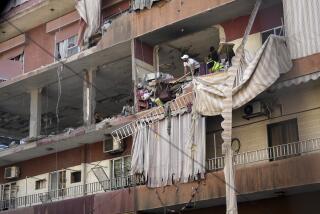Israelis and Palestinians Are Bracing for Violence at Home
- Share via
JERUSALEM — No matter how the Camp David summit ends, Israeli and Palestinian officials are warning of a convulsion of violence from disgruntled masses, and both sides are preparing.
Extremists can be expected to take their anger over an unsatisfactory agreement to the streets. And if no agreement is reached, Palestinian Authority President Yasser Arafat has said he will unilaterally proclaim an independent state, which could lead to bloody clashes with Israel.
The Israeli army, in openly discussing worst-case scenarios, said it is bracing for large-scale Palestinian demonstrations, Palestinian attempts to invade Jewish settlements and the use of live fire by Palestinian snipers. In anticipation, the army has fortified some outposts and handed new ammunition--rubber-coated steel bullets--to settlers. Troops have received special training in riot control, and a senior Israeli officer said the army is prepared to respond to Palestinian violence “with rifles, helicopters, tanks.”
Senior Palestinian security officials, for their part, predicted attempts by Jewish settlers to “spill Palestinian blood,” and warned they would respond “with all options.” The militant Hamas organization is calling for a holy war. And Arafat loyalists have not been shy about publicizing their own military preparations in recent days.
Some of this is no doubt posturing. With notable exceptions, terrorism and bloodshed between the foes are actually on the wane, according to the Israeli government. But both sides also see very real threats to their security and their national goals.
The Israeli army bases its assessments, in part, on events in May. Palestinian crowds protesting the anniversary of the founding of the Jewish state rioted throughout the West Bank and Gaza Strip. At the height of the clashes, Palestinian police turned their guns on Israeli soldiers, an escalation not seen here for years. Calm was restored only after Israel scrambled combat helicopters and threatened to strafe the Palestinians.
Senior Israeli officers say they believe Arafat would use similar violence again to force concessions from the Israeli government. He also has seen the experience of Lebanon, where Islamic militants used force to eject Israel.
But Arafat may be restrained by his need to avoid alienating President Clinton, Western officials say. They see Arafat as holding the violence card in abeyance as long as he needs American money or diplomatic muscle, or sees continued negotiations as useful.
In the meantime, the Palestinians are making a show of their readiness. In the squalid refugee neighborhoods of Gaza, where the intifada began more than a decade ago, Palestinian police and members of Fatah, Arafat’s principal political faction, began holding summer camps to instruct boys in how to kill, fabricate and deliver firebombs, and break down and reassemble automatic rifles.
During a reporter’s visit to one of these camps this week in the Gazan town of Rafah, about 50 children ages 10 to 16 stood at attention, marched in their sandals and shouted loudly on cue: “Long live Palestine! Death to Israel!”
Thousands of youths will go through the training this summer, a Palestinian official said. Diplomats believe the camps violate the peace accords that Arafat has signed with Israel, which restrict the use of weapons to Palestinian police and security services.
“I want to get this training to protect my homeland,” said Eyad Jerjawi, a 15-year-old with 11 younger brothers and sisters. His four uncles were killed in fighting with Israelis. “We don’t want any Jewish settlers in our country,” he said.
Televised scenes from the camps have already become propaganda for Israel’s right wing in protesting efforts by Israeli Prime Minister Ehud Barak to make peace with the Palestinians at Camp David, Md.
The settlers, some of whom would probably have to move if a peace accord is reached, met earlier this month with Israeli army Chief of Staff Lt. Gen. Shaul Mofaz and recounted a litany of fears, from losing army protection to having to turn in their weapons to Palestinians.
“I want you to leave this room with the feeling that we are committed to your security and that no one intends to abandon you,” Mofaz was quoted as telling them. “The soldiers of the [Israeli army] are ready to be killed for the sake of your security.”
Mofaz authorized the distribution of rubber-coated bullets to the settlers on the argument that those would be safer than live ammunition.
*
Times researcher Fayed Abu Shamallah in Gaza contributed to this report.
More to Read
Sign up for Essential California
The most important California stories and recommendations in your inbox every morning.
You may occasionally receive promotional content from the Los Angeles Times.











